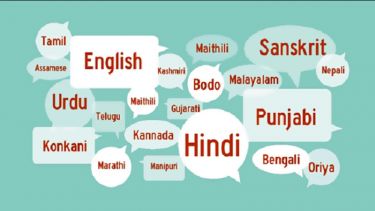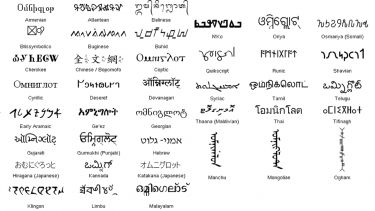Writing Systems #5 – Written vs. Spoken
Language is weird, strange, wonderful, intricate, innovative, confusing, complex, and most of all, multi-layered. There are so many layers and factors that intertwine to create new pieces of language and the way in which we facilitate that is also quite amazing.
Today, I’d like to continue in my vain of writing systems and talk about the differences between written and spoken language.
Which came first?
It’s spoken language. We may be using one of the most common contemporary forms of communication – writing – but it may seem an odd idea that language is only represented by spoken communication. Think about it. Back when our ancestors across the globe did not have tablets (digital or ceramic), parchment or vellum (medieval precursors to paper), what would they use to write things down on? Nothing. There wasn’t a written variety of language. This is almost obvious, but less obvious is that there are still a handful of languages without writing systems even to this day. One example is the Amazonian language variety Pirahã, and another example would be the South Arabian language variety Hobyót. A few other South Arabian languages have, only within the last decade, received accepted writing systems, and whilst they may be available, few speakers may have adopted them as of 2022!
A great deal of language varieties from Melanesia, Micronesia, and Polynesia (all in Oceania) have also technically speaking not got their own writing system as missionaries a few centuries back either ‘donated’ the Latin orthography, or ‘prescribed’ it. The same can be said of Inuktitut, the Inuit language native to Canada where missionaries prescribed the Latin script for the unwritten language. A better example of a language more recently adopting a writing system was that of Cherokee, where an intelligent Cherokee native formulated their own syllabary for the language, which became adopted – and this only happened two centuries ago!
How did writing begin?
Whilst there are clearly no definitive answers on this, nor a singular piece of outstanding evidence to prove it, there is a great amount of evidence that hints at why writing became necessary – which we can analyse through our own human logic. As more and more local populations of people became self-sufficient, there slowly became more interaction between these populations and some realised that they could greatly benefit one another. As regional mobility increased, or the equivalent of mobility in those days, the need for communication increased, which was still likely done in the spoken sense. It was probably important things like produce, money, and certifications for births, deaths, marriages, and lands that led to people wanting to preserve what had been said, and as this began to increase in popularity, writing began to evolve.
Why are there so few unwritten languages?
To put it plainly, writing is an ingenious invention and also a very attractive one. As we have increased in both maturity and intellect, which is not true of all individuals, we have used writing for all sorts of things, varying from economic to religious, creative to sentimental, and communicative to nonsensical – it has, like spoken language and genetics, evolved amazingly and relatively fluidly as language has. This is because it is a part of language.
That said, it should be duly noted that being able to do these things can rapidly increase productivity, efficiency, happiness, wellbeing, intrigue, power, and community, as well as a great cohort of other things. So, where languages did not have a written counterpart, oftentimes when they had either stumbled across foreign peoples or lands, or when those with written language had delivered themselves to remoter areas without it, people in power tended to see the benefits of writing. Whether or not the adoption of the writing system was through humane and genuinely friendly intentions, or through barbaric, culturally destructive means, after said adoption, speaking communities rarely forwent being writing communities due to the opportunities opened up to them.
So Writing is a Function of Speaking?
This is where it starts to get even more interesting! It was thought for a while that writing was just a register of spoken language, as in the written register, but as global literacy rates have improved on the whole and more people have access to writing and the linguistic corpus for information has exponentially grown, it can be said that writing is not merely a register or function of spoken language. If it is, then how come writing itself proposed many new and different registers than in spoken language?
Writing has many evolutionary and variational parallels to spoken language. Some easy ones to mention are that they can be both be seen to have dialectal markers, specific registers, and changes over time. They both have different systems in which they can be ordered. They both contain the ability to decorate your own identity linguistically – spoken language can see different vocabularies, pitches, intonations, and accents, whilst written language can use different vocabularies, fonts, sizes, and colours.
Some have also identified that the recognitional faculties within the brain may also be responsible for the ability to read, which sets spoken and written language apart as the mechanisms in which the content is understood differ vastly and traverse different cognitive pathways. There is a lot to be learned about the brain and a lot yet to discover about it, and whilst many believe there to be no new part of the brain evolved specifically for the faculty of writing, others have argued the ability to write has been spread across different loci of the brain. This idea is similar to what actually happens with spoken language, and we continue to locate new parts of the brain that appear to be related to a particular linguistic function. Who’s to say we won’t soon enough find something relevant to writing?
Writing has some similar and very interconnected faculties with speech, but then it also spreads neurologically across different pathways which cause different mechanisms for both output forms and evolutionary possibility. As medical sciences get evermore intelligent, we are able to save more people that would otherwise not survive and as a result, there is a greater pool of data from individuals to study. These neurolinguistically different individuals tell us a great deal more about language and the brain than the majority of those who are neurolinguistically ‘normal’ (if you will excuse the term) as they can underpin what happens when damage occurs to the brain. This, coupled with data already collected, which suggests more faculties spread across the brain rather than being as localised as we once thought, provides some interesting evidence that suggests language has many faculties, of which, writing and speaking are just two, not to mention probable listening, comprehension, conceptualisation, and maybe even reading. A very different set of faculties indeed.
Next time, after having gone over the concept of alphabets and the actual writing systems we can observe in the world, I shall go over the concept of the letter…
Written by DP, Digital Student Ambassador, on 1 April 2022.

Experience Sheffield for yourself
The best way to find out what studying at Sheffield is like is to visit us. You'll get a feel for the atmosphere, the people, the campus and the city.



